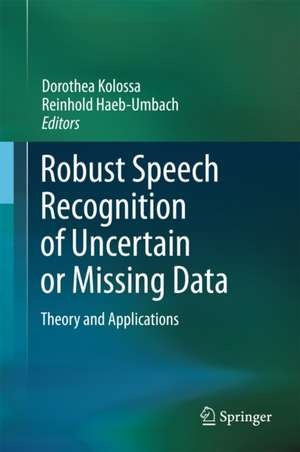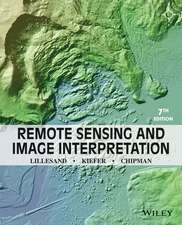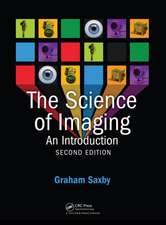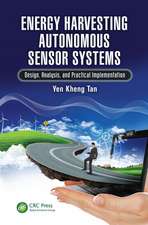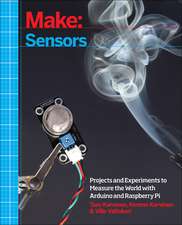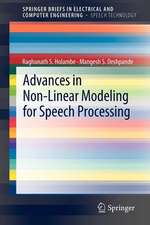Robust Speech Recognition of Uncertain or Missing Data: Theory and Applications
Editat de Dorothea Kolossa, Reinhold Haeb-Umbachen Limba Engleză Hardback – 14 iul 2011
The book is appropriate for scientists and researchers in the field of speech recognition who will find an overview of the state of the art in robust speech recognition, professionals working in speech recognition who will find strategies for improving recognition results in various conditions of mismatch, and lecturers of advanced courses on speech processing or speech recognition who will find a reference and a comprehensive introduction to the field. The book assumes an understanding of the fundamentals of speech recognition using Hidden Markov Models.
| Toate formatele și edițiile | Preț | Express |
|---|---|---|
| Paperback (1) | 645.47 lei 6-8 săpt. | |
| Springer Berlin, Heidelberg – 12 noi 2014 | 645.47 lei 6-8 săpt. | |
| Hardback (1) | 651.84 lei 6-8 săpt. | |
| Springer Berlin, Heidelberg – 14 iul 2011 | 651.84 lei 6-8 săpt. |
Preț: 651.84 lei
Preț vechi: 766.87 lei
-15% Nou
Puncte Express: 978
Preț estimativ în valută:
124.74€ • 135.45$ • 104.79£
124.74€ • 135.45$ • 104.79£
Carte tipărită la comandă
Livrare economică 22 aprilie-06 mai
Preluare comenzi: 021 569.72.76
Specificații
ISBN-13: 9783642213168
ISBN-10: 3642213162
Pagini: 394
Ilustrații: XVIII, 380 p.
Dimensiuni: 155 x 235 x 33 mm
Greutate: 0.74 kg
Ediția:2011
Editura: Springer Berlin, Heidelberg
Colecția Springer
Locul publicării:Berlin, Heidelberg, Germany
ISBN-10: 3642213162
Pagini: 394
Ilustrații: XVIII, 380 p.
Dimensiuni: 155 x 235 x 33 mm
Greutate: 0.74 kg
Ediția:2011
Editura: Springer Berlin, Heidelberg
Colecția Springer
Locul publicării:Berlin, Heidelberg, Germany
Public țintă
ResearchCuprins
Chap. 1 – Introduction.-
Part I – Theoretical Foundations.-
Chap. 2 – Uncertainty Decoding and Conditional Bayesian Estimation.- Chap. 3 – Uncertainty Propagation.-
Part II – Applications.-
Chap. 4 – Front-End, Back-End, and Hybrid Techniques for Noise-Robust Speech Recognition.- Chap. 5 – Model-Based Approaches to Handling Uncertainty.- Chap. 6 – Reconstructing Noise-Corrupted Spectrographic Components for Robust Speech Recognition.- Chap. 7 – Automatic Speech Recognition Using Missing Data Techniques: Handling of Real-World Data.- Chap. 8 – Conditional Bayesian Estimation Employing a Phase-Sensitive Estimation Model for Noise-Robust Speech Recognition.-
Part III – Reverberation Robustness.-
Chap. 9 – Variance Compensation for Recognition of Reverberant Speech with Dereverberation Processing.- Chap. 10 – A Model-Based Approach to Joint Compensation of Noise and Reverberation for Speech Recognition.-
Part IV – Applications: Multiple Speakers and Modalities.-
Chap. 11 – Evidence Modelling for Missing Data Speech Recognition Using Small Microphone Arrays.- Chap. 12 – Recognition of Multiple Speech Sources Using ICA.- Chap. 13 – Use of Missing and Unreliable Data for Audiovisual Speech Recognition.-
Index.
Part I – Theoretical Foundations.-
Chap. 2 – Uncertainty Decoding and Conditional Bayesian Estimation.- Chap. 3 – Uncertainty Propagation.-
Part II – Applications.-
Chap. 4 – Front-End, Back-End, and Hybrid Techniques for Noise-Robust Speech Recognition.- Chap. 5 – Model-Based Approaches to Handling Uncertainty.- Chap. 6 – Reconstructing Noise-Corrupted Spectrographic Components for Robust Speech Recognition.- Chap. 7 – Automatic Speech Recognition Using Missing Data Techniques: Handling of Real-World Data.- Chap. 8 – Conditional Bayesian Estimation Employing a Phase-Sensitive Estimation Model for Noise-Robust Speech Recognition.-
Part III – Reverberation Robustness.-
Chap. 9 – Variance Compensation for Recognition of Reverberant Speech with Dereverberation Processing.- Chap. 10 – A Model-Based Approach to Joint Compensation of Noise and Reverberation for Speech Recognition.-
Part IV – Applications: Multiple Speakers and Modalities.-
Chap. 11 – Evidence Modelling for Missing Data Speech Recognition Using Small Microphone Arrays.- Chap. 12 – Recognition of Multiple Speech Sources Using ICA.- Chap. 13 – Use of Missing and Unreliable Data for Audiovisual Speech Recognition.-
Index.
Notă biografică
Prof. Dr.-Ing. Dorothea Kolossa is a professor at the Institut für Kommunikationsakustik of the Ruhr-Universität Bochum, Germany; her research interests are automatic speech recognition, digital speech signal processing, and blind source separation.
Prof. Dr.-Ing. Reinhold Haeb-Umbach heads the Dept. of Communications Engineering of the University of Paderborn, Germany; his research interest are speech signal processing and automatic speech recognition, statistical learning and pattern recognition, and signal processing for digital communications.
Prof. Dr.-Ing. Reinhold Haeb-Umbach heads the Dept. of Communications Engineering of the University of Paderborn, Germany; his research interest are speech signal processing and automatic speech recognition, statistical learning and pattern recognition, and signal processing for digital communications.
Textul de pe ultima copertă
Automatic speech recognition suffers from a lack of robustness with respect to noise, reverberation and interfering speech. The growing field of speech recognition in the presence of missing or uncertain input data seeks to ameliorate those problems by using not only a preprocessed speech signal but also an estimate of its reliability to selectively focus on those segments and features that are most reliable for recognition. This book presents the state of the art in recognition in the presence of uncertainty, offering examples that utilize uncertainty information for noise robustness, reverberation robustness, simultaneous recognition of multiple speech signals, and audiovisual speech recognition.
The book is appropriate for scientists and researchers in the field of speech recognition who will find an overview of the state of the art in robust speech recognition, professionals working in speech recognition who will find strategies for improving recognition results in various conditions of mismatch, and lecturers of advanced courses on speech processing or speech recognition who will find a reference and a comprehensive introduction to the field. The book assumes an understanding of the fundamentals of speech recognition using Hidden Markov Models.
The book is appropriate for scientists and researchers in the field of speech recognition who will find an overview of the state of the art in robust speech recognition, professionals working in speech recognition who will find strategies for improving recognition results in various conditions of mismatch, and lecturers of advanced courses on speech processing or speech recognition who will find a reference and a comprehensive introduction to the field. The book assumes an understanding of the fundamentals of speech recognition using Hidden Markov Models.
Caracteristici
Scientists and researchers in the field of speech recognition will find an overview of the state of the art in robust speech recognition. Professionals working in speech recognition will find strategies for improving results in various conditions of mismatch. The contributing authors are among the leading researchers in this field.
